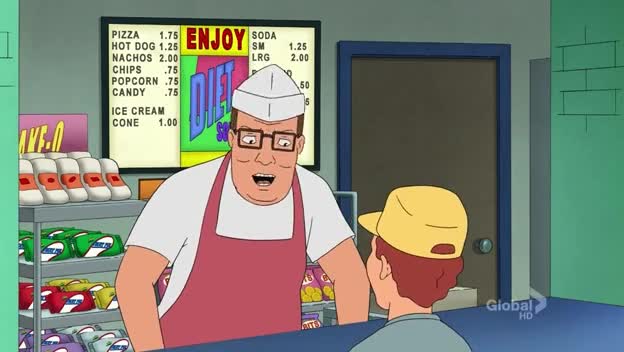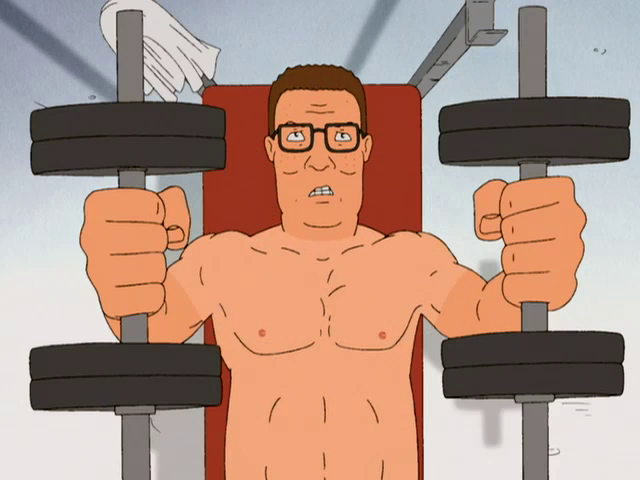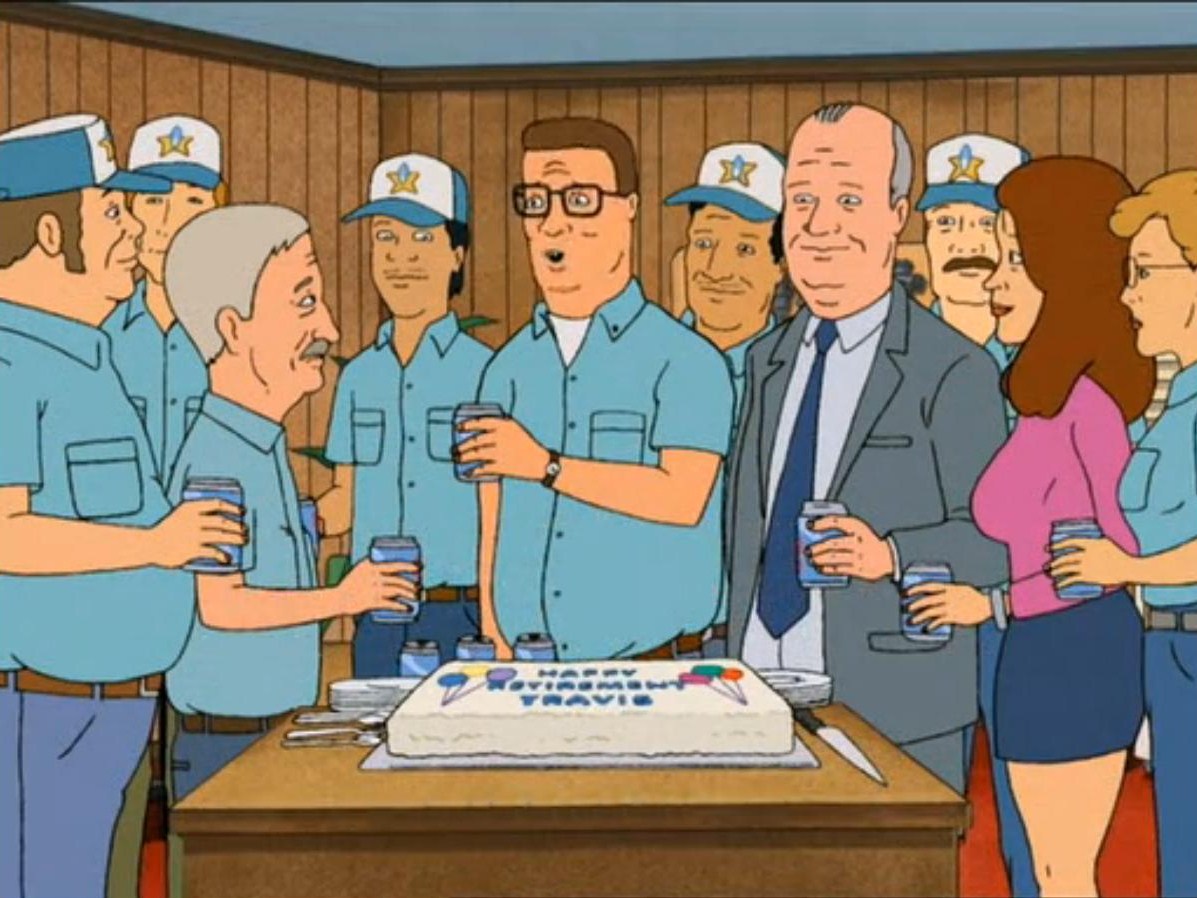
Some people have a calling in life and they go to great lengths to pursue it. Not everyone has the opportunity or resources, but those who do show a genuine passion for their calling. Their talents, skills, and work ethic reveal themselves and it nicely reflects the kind of person they are.
For Hank Hill of “King of the Hill,” selling propane and propane accessories is definitely his calling. He pursues it with a passion that few can match, regardless of whether they exist in the real world or animated shows from the early 2000s. It’s a big part of his character and I’ve highlighted on multiple occasions how it reflects concepts ranging from noble masculinity to a good work ethic.
Hank is a rare breed among fictional characters. He doesn’t spend all 13 seasons of his show endlessly driving to achieve his dream job. He already has his dream job. He loves what he does and he dedicates himself to doing well. It’s part of what makes him a respectable, engaging character.
While I don’t deny Hank Hill’s passion for propane and propane accessories, I would also make the argument that the same skills with which he does that job so well also makes him perfectly suited for another job, namely that of a pimp. As it just so happens, it’s a job he briefly did in Season 5, Episode 13, “Ho Yeah!”

Granted, he did that job unknowingly, as Hank can be laughably oblivious at times, but that one episode has always been a personal favorite of mine. In watching it multiple times, it convinced me of something. Hank Hill, armed with the same skills that help him sell propane and propane accessories, would make the perfect pimp.
I know the popular image of pimps is mixed, at best. Some that has more to do with the illegality of prostitution, which I’ve talked about before, but it’s the world’s oldest profession for a reason. Where there are prostitutes, there are also people who manage them. Call them what you want. Pimp just happens to be the most comprehensive in a modern context.
Setting aside the legality of prostitution and the less-than-respectable behavior associated with pimps, I contend that Hank would be able to navigate the world of prostitution and pimping better than almost anyone, fictional or otherwise. He would set a gold standard in how to succeed in this lurid industry in all the right ways for all the right reasons.
What follows are six reasons that I believe prove that Hank Hill would make the perfect pimp. Having seen every episode of “King of the Hill” and researched the sex industry, I’ll try to make my points as effectively as possible. In the spirit of Hank’s dedication to getting the job done, I can do no less.
Reason #1: He Makes Customer Satisfaction A Top Priority

In the context of prostitution, customer satisfaction may seem like an afterthought and for good reason. It’s a service that involves providing intimacy and pleasure to a client in one of the most basic ways possible. Aside from connecting prostitutes with clients, how can a pimp affect this?
This is where Hank’s unceasing dedication to customer service comes in. Throughout many episodes in “King of the Hill,” he puts satisfying the customer first. His approach is simple. If the customer is satisfied, then both the products and the business take care of themselves.
This is wonderfully demonstrated in Season 7, Episode 16, “The Miseducation of Bobby Hill” in which Hank’s customer-oriented sales tactics win out over the less scrupulous approach that Bobby tried. As is often the case, Hank emphasizes doing things the right way and not in the way that’s most expedient.
As a pimp, Hank would definitely emphasis this for those working for him. Just as he tried to do with Bobby, he would preach customer satisfaction over money or expediency. He would tell them not to do the bare minimum. He believes in making sure customers are fully satisfied with their service and then some.
That kind of satisfaction breeds customer loyalty. In any industry, including prostitution, a loyal customer base goes a long way towards success. It’s why companies like Apple can get away with charging extra for their products. They’ve earned their consumer’s loyalty. For Hank, that loyalty is often more valuable than money.
Reason #2: He Commands Loyalty For The Right Reasons

This builds directly off the first reason, but it goes beyond just satisfying the customer. For Hank Hill, loyal customers aren’t just an important component of sales. Loyalty from co-workers and superiors is every bit as important. That loyalty isn’t given to him, either. He earns it, even when the people he works with don’t make it easy for him.
A prostitute working for Hank Hill wouldn’t be expected to give their loyalty by default. He would earn that loyalty by demonstrating how hard he’s willing to work. He would set an example for those around him. That means showing up on time, responding to calls or complaints, and resolving conflicts quickly and effectively.
While the propane industry is very different from the sex industry, I would argue the value of loyalty is much greater in prostitution. One of the key responsibilities of a pimp or manager is to ensure that those around them feel safe, secured, and valued. At no point in any episode of “King of the Hill” does he ever see his fellow employees as cogs in a machine.
He calls people by their first name. He treats them with the same respect that he seeks. For prostitutes, who are more likely to deal with difficult customers than propane salesmen, this kind of dedication is invaluable. They would feel safe and comfortable going to Hank with their issues and feel confident that he could resolve them.
If satisfying the customer is the top priority, then earning the loyalty of employees is a close second. Hank dedicates himself to both. It helped Strickland Propane succeed over the course of 13 seasons. It would serve him well as a pimp.
Reason #3: He Sets High Standards For Employees, Products, And Services

You could accuse Hank Hill a lot of things. He can be uptight, dense, and exceedingly set in his ways. He’ll even get upset when his favorite mower is revamped. However, nobody will ever accuse him of having low standards.
When it comes to his job, Hank sets the bar high for everything. Whether it’s the quality of the grill or the safety of a propane tank, he will never settle for anything sub-standard. Maintaining that quality for both products and services are critical in every industry. Prostitution is no exception.
Hank would not be the kind of pimp who encourages his prostitutes to do the bare minimum. Anyone could get a customer off. He would set his sights higher for both his customers and his prostitutes. He would expect them to go the extra mile with respect to serving the customer and presenting themselves as a competent employee.
He wouldn’t just bark orders, though. In multiple episodes, Hank is shown doing everything from polishing propane tanks to arranging the grills. For his prostitutes, he would make sure that their clothes, their makeup, and whatever accessories they might use are of the highest quality. He would not settle for trashy or dirty. That would be like selling a rusty propane tank.
I imagine some of the prostitutes would be annoyed by such standards, but those who take it seriously would reap the benefits. Those who don’t abide by those standards would either be let go or would never work with him in the first place. Hank is not one to just tell people the right way to do things. He lets the results speak for themselves and most of the time, they prove him right.
Reason #4: He Dedicated Himself To His Work And Maintains A Working Knowledge Of Everything It Involves

To succeed in any industry, it helps to have in-depth knowledge of it. When it comes to propane, you won’t find many people who are as knowledgeable or informed as Hank Hill. He knows propane and propane accessories. It’s not just facts and details, either. His face lights up whenever people talk about it. When something happens in the propane world, he knows about it.
That kind of dedication is just as important in sex work. Most people know how sex works in the same way they know how a grill works. However, only someone as knowledgeable as Hank understands the nuts and bolts to it all. Imagine if someone had the same working knowledge of sex work as Hank does with propane. That kind of expertise would go a long way.
As a pimp truly dedicated to his craft, Hank would understand the workings of successful sex work the same way he does with grills. He would know the difference between an effective tool and a trendy gimmick. For the prostitutes and the clients they serve, it would maintain those high standards he sets.
Beyond just knowing his trade, Hank would go out of his way to educate others. In the show, he never misses an opportunity to tell someone about propane. As a pimp, he would never hesitate to tell an aspiring prostitute how to do their job well. Like any profession, people may think they know what it entails, but someone like Hank would be able to help them see the forest from the trees.
Reason #5: He Treats His Employees Fairly And Goes Out Of His Way To Support Them

Throughout the course of “King of the Hill,” the employees of Strickland Propane rarely change. While most of them are background characters, some distinguish themselves more than others. Some episodes focus entirely on Hank helping them deal with their issues, even when it doesn’t involve their work.
That’s because, as I noted earlier, Hank doesn’t see his employees as cogs in a machine. He treats them like human beings. If they have an issue, he’ll help them as best he can. He’s always honest, transparent, and genuine with them.
Those practices are even more effective as a pimp. Prostitution is an intimate business, in more ways than one. They’re selling more than just a product. They’re selling an experience. Having someone like Hank, who supports them and treats them fairly, would go a long way towards helping them deliver that experience.
Beyond just being there for them, Hank is also someone who understands that work life is work life and personal life is none of his business. He’s not the kind of person who micromanages his employees when they’re off the clock. In fact, he sets clear and unambiguous boundaries about what constitutes work and what constitutes personal affairs.
In an industry where pimps have been known to micromanage prostitutes to an egregious extent, Hank Hill would offer the perfect balance. He would give prostitutes an ability to separate their life as a sex worker from the personal life they’re trying to build. For those looking for a job and not wanting it to define them, this would set Hank apart from other pimps in the best possible way.
Reason #6: He’s Willing To Kick An Ass When It Needs To Be Kicked

I don’t think I need to make an elaborate argument for this reason. Hank Hill’s ability and willingness to kick ass is well documented throughout the show. Generally, he avoids confrontations, but he will kick an ass when it needs to be kicked. He even proved that in “Ho Yeah!” when he took on another pimp who dared to challenge him. Needlessly to say, Hank won.
As dedicated as Hank is to serving customers and helping employees, he has a limit to how much bullshit he’ll endure. If someone dares cross a certain threshold, he won’t hesitate to respond. If someone disrespects one of his prostitutes or even his loyal customers, he won’t hold back. He’ll kick all the asses that need kicking.
For his prostitutes, it only deepens that loyalty he so values. Even other clients could appreciate that. Hank Hill may be uptight and uncompromising, but he doesn’t give a pass to people who cross lines that shouldn’t be crossed. He will kick ass and he’ll make sure he kicks the right ones.
There are probably many other reasons why Hank Hill would make a great pimp. If you have a few I didn’t mention, please share them in the comments. Hank is a great character and “King of the Hill” did plenty to show why he’s so compelling.
Even though his pimping potential may never be realized, but even Tammi, the secret prostitute at the center of the “Ho Yeah!” episode, told him outright that he would be a great pimp. I just don’t think she realized how right she was.











